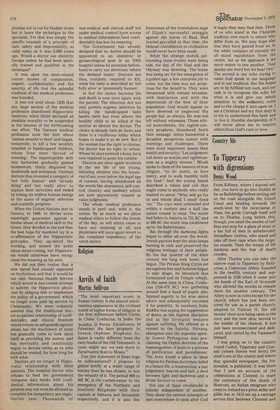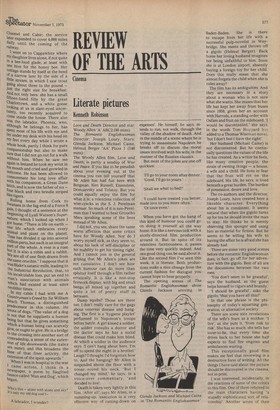Country life
To Tipperary with digressions
Denis Wood
From Killiney, where I started one day, you have to go into Dublin as far as Ballsbridge before setting out on the road alongside the Grand Canal and heading towards the south-west by the racecourse at Naas, the great Curragh itself and on to Thurles. Long before this, though, you smell the smoke of turf fires and stop for a glass of stout at a bar full of men in unbelievably threadbare clothes, who stand and take off their caps when the Angelus sounds. Then the tempo of life slackens and the fear of death recedes.
After Thurles you can take the narrow road to Tipperary by Holycross, a Cistercian Abbey founded in the twelfth century and suppressed in 1536 when it came into the hands of the Earl of Ormonde who allowed the monks,to remain there for another century. The Abbey is now in ruins except for the church, which has just been restored for use as a parish church, adapted to Vatican II, the old monks' choir now being open to the nave and the new altar moved to the middle of the chancel. It has just been reconsecrated and dedicated, and visited by the Taoiseach himself.
I was going on to the country round Cashel, Tipperary and Clonmel (where Sterne was born) the chief town of the county and where that splendid newspaper, the Nationalist, is published. It was there that I saw an account of the celebrations at Clonmel to mark the centenary of the death of Bianconi, an Italian emigrant who came to Ireland as a print-seller and gilder but in 1815 set up a carriage service first between Clonmel and
Clonmel and Cahir; the service later expanded to cover 4,000 miles daily until the coming of the railway.
I went on to Cappawhite where ihy daughter lives alone, if not quite In a bee-loud glade, at least with one hive for the honey bee. Her cottage stands by itself at the bend of a narrow lane by the side of a little stream, in which I saw trout ping about three to the pound — Just the right size for breakfast. And not only bees: she has a small fifteen-hand filly by the great Charlottown, and a white goose looking at us in slant-eyed uncertainty, too recently acquired to come inside the house. There also was the labrador, Phoenix, who,
although he belongs to her, has spent most of his life with me and lay under my desk with his head on my feet every day while I wrote a Whole book, partly I think for pure companionship but also to make sure that I did not go out for a walk Without him. When he saw me again in Ireland he took my wrist in his mouth and cried and growled in welcome. He has been allowed to consummate his long love affair with his companion, a Great Dane
hitch, and is now the father of six — four black and two brindle striped like tigers. Rolling home from Cork to Swansea in the fag-end of a Force 8 gale, I thought of a sentence at the beginning of Lyall Watson's Supernature, which I looked up when I got home. "There is life on earth — one life which embraces every animal and plant on the planet. Time has divided it up into several million parts, but each is an integral part of the whole. A rose is a rose but it is also a robin and a rabbit. We are all of one flesh drawn from the same crucible." I suppose that it was Blake's satanic mills, leading to the Industrial Revolution, that, to his incalculable loss, put an end to man's association with animals Which had existed at least since neolithic times.
In my cabin I had with me A Countryman's Creed by Sir William Beach Thomas, a distinguished predecessor in this column. He wr. ote of dogs, "The value of a dog Is not that he supplants a human
being but that he gives something Which a human being can scarcely
give, or ought to give. He is a bridge to the crossing into another sort of comradeship, a sense of the extension of life downwards (the italics are mine); and this broadens the base of that finer activity, the extension of the spirit upwards."
When I was in hospital in the war I came across, I think in a newspaper, a poem by Siegfried
basson called 'Man and Dog', which began,
Who's this — alone with stone and sky? It's only my old dog and I
A labrador, I wonder?

































 Previous page
Previous page